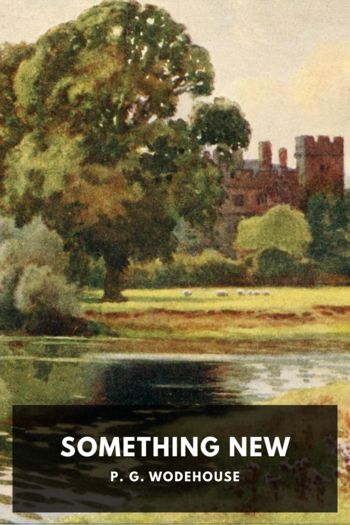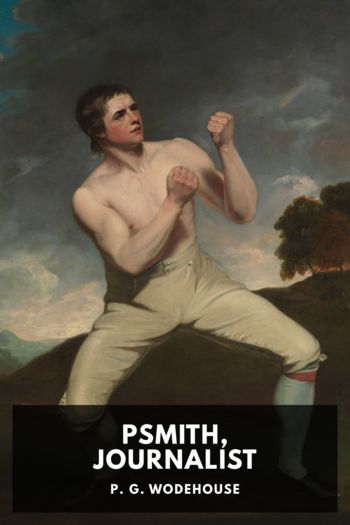Leave It to Psmith by P. G. Wodehouse (best ereader for academics TXT) 📕

- Author: P. G. Wodehouse
Book online «Leave It to Psmith by P. G. Wodehouse (best ereader for academics TXT) 📕». Author P. G. Wodehouse
Eve clutched wildly at his retreating sleeve. Unintelligible though his words had been, one sentence had come home to her, the one about Phyllis having her money. It was no time for half-measures. She grabbed him.
“Mr. Keeble,” she cried urgently. “I don’t know what you mean, but you were just going to say something which sounded … Mr. Keeble, do trust me. I’m Phyllis’s best friend, and if you’ve thought out any way of helping her I wish you would tell me … You must tell me. I might be able to help …”
Mr. Keeble, as she began her broken speech, had been endeavouring with deprecatory tugs to disengage his coat from her grasp. But now he ceased to struggle. Those doubts of Freddie’s efficiency, which had troubled him in Jno. Banks’s chair, still lingered. His opinion that Freddie was but a broken reed had not changed. Indeed, it had grown. He looked at Eve. He looked at her searchingly. Into her pleading eyes he directed a stare that sought to probe her soul, and saw there honesty, sympathy, and—better still—intelligence. He might have stood and gazed into Freddie’s fishy eyes for weeks without discovering a tithe of such intelligence. His mind was made up. This girl was an ally. A girl of dash and vigour. A girl worth a thousand Freddies—not, however, reflected Mr. Keeble, that that was saying much. He hesitated no longer.
“It’s like this,” said Mr. Keeble.
IVThe information, authoritatively conveyed to him during breakfast by Lady Constance, that he was scheduled that night to read select passages from Ralston McTodd’s Songs of Squalor to the entire house-party assembled in the big drawing-room, had come as a complete surprise to Psmith, and to his fellow-guests—such of them as were young and of the soulless sex—as a shock from which they found it hard to rally. True, they had before now gathered in a vague sort of way that he was one of those literary fellows, but so normal and engaging had they found his whole manner and appearance that it had never occurred to them that he concealed anything up his sleeve as lethal as Songs of Squalor. Among these members of the younger set the consensus of opinion was that it was a bit thick, and that at such a price even the lavish hospitality of Blandings was scarcely worth having. Only those who had visited the castle before during the era of her ladyship’s flirtation with Art could have been described as resigned. These stout hearts argued that while this latest blister was probably going to be pretty bad, he could hardly be worse than the chappie who had lectured on Theosophy last November, and must almost of necessity be better than the bird who during the Shifley race-week had attempted in a two-hour discourse to convert them to vegetarianism.
Psmith himself regarded the coming ordeal with equanimity. He was not one of those whom the prospect of speaking in public afflicts with nervous horror. He liked the sound of his own voice, and night, when it came, found him calmly cheerful. He listened contentedly to the murmur of the drawing-room filling up as he strolled on the starlit terrace, smoking a last cigarette before duty called him elsewhere. And when, some few yards away, seated on the terrace wall gazing out into the velvet darkness, he perceived Eve Halliday, his sense of well-being became acute.
All day he had been conscious of a growing desire for another of those cosy chats with Eve which had done so much to make life agreeable for him during his stay at Blandings. Her prejudice—which he deplored—in favour of doing a certain amount of work to justify her salary, had kept him during the morning away from the little room off the library where she was wont to sit cataloguing books; and when he had gone there after lunch he had found it empty. As he approached her now, he was thinking pleasantly of all those delightful walks, those excellent driftings on the lake, and those cheery conversations which had gone to cement his conviction that of all possible girls she was the only possible one. It seemed to him that in addition to being beautiful she brought out all that was best in him of intellect and soul. That is to say, she let him talk oftener and longer than any girl he had ever known.
It struck him as a little curious that she made no move to greet him. She remained apparently unaware of his approach. And yet the summer night was not of such density as to hide him from view—and, even if she could not see him, she must undoubtedly have heard him; for only a moment before he had tripped with some violence over a large flowerpot, one of a row of sixteen which Angus McAllister, doubtless for some good purpose, had placed in the fairway that afternoon.
“A pleasant night,” he said, seating himself gracefully beside her on the wall.
She turned her head for a brief instant, and, having turned it, looked away again.
“Yes,” she said.
Her manner was not effusive, but Psmith persevered.
“The stars,” he proceeded, indicating them with a kindly yet not patronising wave of the hand. “Bright, twinkling, and—if I may say so—rather neatly arranged. When I was a mere lad, someone whose name I cannot recollect taught me which was Orion. Also Mars, Venus, and Jupiter. This thoroughly useless chunk of knowledge has, I am happy to say, long since passed from my mind. However, I am in a position to state that that wiggly thing up there a little to the right is King Charles’s Wain.”
“Yes?”
“Yes, indeed, I assure you.” It struck Psmith that Astronomy was not gripping his audience, so he tried Travel. “I hear,” he said, “you went to Market Blandings this afternoon.”
“Yes.”
“An attractive settlement.”
“Yes.”
There was a pause. Psmith removed his monocle and polished it thoughtfully. The summer night seemed to him





Comments (0)